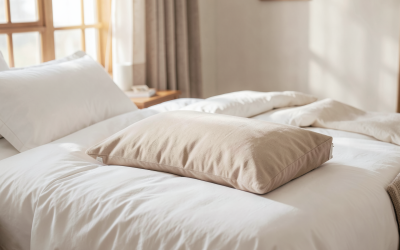We’ve all heard the warning to not sleep on our stomachs; that it can cause wrinkles and other skin problems. But is it really true? In this article, we’ll be exploring the potential benefits and risks of sleeping on your stomach, how it affects the breasts and other skin areas, prevention methods and treatments for sagging skin, and an overall conclusion of whether or not it is actually bad to sleep on your stomach.
Benefits and Risks of Sleeping on Your Stomach
It’s no secret that sleeping on your stomach might offer some advantages. Namely, it prevents acid reflux and reduces snoring, since the stomach-sleeper’s mouth and throat are free from obstruction. It also supports proper posture and can help with neck pain; however, it can potentially cause back and shoulder issues due to the lack of support to the spine. And of course, there is the fear of developing wrinkles or sagging skin.
Sleeping on your stomach can also be beneficial for those who suffer from sleep apnea, as it can help to keep the airways open. Additionally, it can be a great position for those who are pregnant, as it can help to reduce the pressure on the abdomen. However, it is important to note that this position can be uncomfortable for some people, and it is not recommended for those who suffer from chronic back pain.
How Does Sleeping on Your Stomach Affect Your Breasts?
The problem with sleeping on your stomach, from a breast perspective, is that gravity works against you in this position. When sleeping on your stomach, the weight of your breast tissue is pulled in all directions. This can lead to excessive stretching of the skin and ligaments, resulting in sagging or wrinkles. In addition, the chest muscles can become tight from the pressure, leading to more wrinkles as well.
What Causes Sagging Skin on the Breasts?
Age is the most common cause of sagging skin on the breasts. As we age, our bodies naturally produce less collagen and elastin, the two proteins that give skin its tightness, resulting in the dreaded “droopy” or “saggy” breast look. Genetics can also play a role—anything from naturally larger breasts to being overweight or having an unhealthy lifestyle can have an effect on the strength and elasticity of our skin.
How to Prevent Wrinkles and Sagging Skin on the Breasts
Firstly, diversifying your sleep positions can help reduce wrinkles and sagging skin. Try laying on your back with a flat pillow placed under your neck and support for your back; or laying on your side with a flat pillow between your knees. Secondly, regular exercise helps to strengthen your breast muscles, which could help combat premature sagging. Lastly, using a moisturizer and/or sunscreen after showering keeps skin hydrated and protected from damaging UV rays.
Tips for Better Sleep Posture and Comfort
If you absolutely must sleep on your stomach for medical reasons, here are some tips to make the experience more comfortable: Use a pillow that is still flat but thicker than your usual one; consider placing a rolled up towel under your hips to take some pressure off your abdomen; use a memory foam mattress; and practice good posture while sleeping. All these things combined can help reduce long-term effects on your breasts.
Potential Treatments for Sagging Skin on the Breasts
If you find yourself already dealing with sagging skin on the breasts due to sleeping on your stomach, there are several treatments available. Common options include surgery such as a breast lift or augmentation; nonsurgical treatments such as laser skin tightening or dermal fillers; and topical creams and serums. Ultimately, it’s important to talk to a doctor before deciding which one is best for you.
Is It Bad to Sleep on Your Stomach?
The answer may vary from person to person. If you’re someone who only needs to sleep in this position due to health reasons, then it may be okay; however, if you’re someone who has more flexibility in their sleep positions, it’s safer to avoid sleeping on your stomach. If you must do so, ensure that you’re doing everything in your power to maintain proper posture while lying down, as well as taking precautionary steps like changing up positions and investing in thicker pillows.
Summary: What You Need to Know About Sleeping on Your Stomach
Before concluding that it’s bad to sleep on your stomach, let’s consider the facts. Yes, it can potentially lead to wrinkles or sagging skin on the breasts; however, if you must sleep in this position due to other health reasons, there are precautions you can take to minimize any long-term effects. Alternating between positions regularly and practicing good posture while lying down can go a long way in maintaining healthy skin. And if needed, there are treatments you can consider if you experience any lasting effects.



